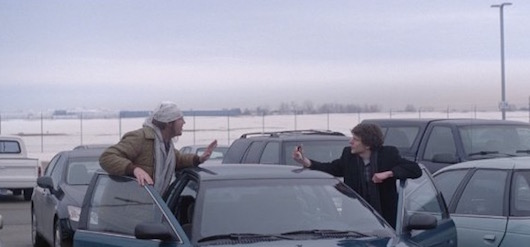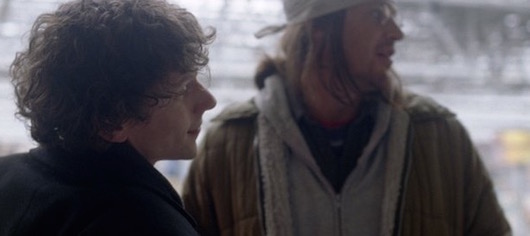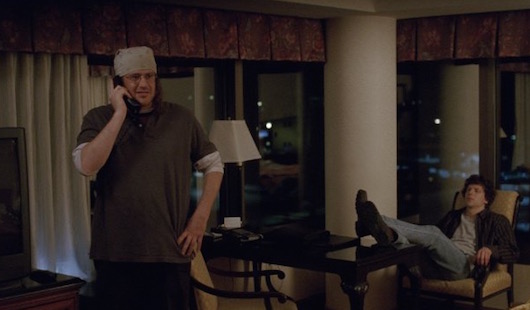 FILM
FILM « In Which We Will Ask You To Keep It In Your Backpack »
 Tuesday, August 25, 2015 at 10:07AM
Tuesday, August 25, 2015 at 10:07AM 
Interjection
by TAYLOR HINE
If, in conversation, I don’t understand a reference, I have this habit (one that I’m trying really hard to break) of going along with it anyway, thinking that the risk of looking uninformed or stupid is diminished if I only appear to understand it. I can get away with this sometimes. But it’s also landed me in trouble, if not with others, then with myself. I’ll feel as though I betrayed the both of us during discourse long after it’s over.
When my boyfriend told me about Infinite Jest and its complexities, I couldn’t even pretend to have heard of the novel before. I hadn’t – not in any meaningful way, until he recommended it to me. I hadn’t heard of David Foster Wallace, either. From the way my boyfriend described Wallace’s work, I would have felt especially like a cheat if I’d done anything other than let him talk about Wallace. I also knew he’d catch me in the lie.

When, though, on my first day of college, I saw a guy pulling Infinite Jest out of his backpack before our biology class, I had to say something. He wore baggy clothes and looked almost as scared as I felt. Students were milling about the stadial classroom, calling out to friends or finding a place to sit on their own. We were in the back row, where everyone sat alone rather than in groups.
“David Foster Wallace,” I called down the row of seats to him in a friendly voice, smiling.
He beamed. “You’ve read Infinite Jest?” It was more appraisal than an actual question. I didn’t even know this guy’s name and I was about to lie to him.
“Most of it,” I said. He nodded his approval and started reading.
+
Watching The End of the Tour, I realized that pretending to have read Infinite Jest would have been exactly something that Wallace – or anyone who wants to have meaningful conversations – would hate. Pretending to connect with someone often means that you want someone – perhaps someone you know, or someone you think you’d like to befriend – to like you so much that you’ll say virtually anything to get their approval.
The relationship that arises out of David Lipsky (played by Jesse Eisenberg) wanting to interview David Foster Wallace (played by Jason Segel) is rooted in self-interest, at least on Lipsky’s part: he wants to talk to Wallace both for a Rolling Stone interview (despite the magazine never having profiled a writer in the past) and, perhaps, to gain some writerly wisdom from someone he admires. (And he’s going to join him on the last stop of his Infinite Jest book tour, no less.) Why else would he have suggested profiling him? Lipsky has to get the best interview he can; his editor demands that he get Wallace to essentially spill his guts. Nevertheless, a friendship grows between the two Davids: Lipsky sees that to be understood as a person rather than a capital-w Writer is most important. He travels to Bloomington, Illinois, one of those regular places of the most midwestern variety, and stays with Wallace in his modest brick house facing an open field in the dead of winter.

Oddly enough, the piece was never published. According to Rolling Stone, “a series of events took place — a rock star's untimely death, a heated political season — and the profile never saw publication.”
The film doesn’t set out to mythologize Wallace the Writer. In fact, it does the opposite: it shows us Wallace the Human, Wallace the Regular Guy. Where Lipsky may have thought that the story of David Foster Wallace was of the Rolling Stone truth-be-told caliber, he realizes by the end that the real story is in understanding and connecting with Wallace on a deeper level. Once, when Wallace and Lipsky are watching TV (which, he claims, he would do every minute of every day if he owned one) with a couple of Wallace’s friends – an old classmate, Betsy, a poet and something of a love interest, and a fan of his, named Julie–Betsy gives Lipsky a copy of the literary magazine she’d recently gotten her poem published in. Lipsky, too, is a fledgling writer; he had his first novel published recently. Wallace eyes them pointedly from the couch, then corners Lipsky in the kitchen later, telling him to leave her alone. “Be a good guy,” Wallace says. In retaliation, Lipsky cracks open a beer after promising Wallace he wouldn’t drink around him.
See, guys? These are people like us.

The End of the Tour was a familiar story to me. Getting to know someone you’ve admired from afar is a pleasure, especially when you find that you two get along better than you have with anyone else in quite awhile. But more than that, they didn’t pretend to be anything more than themselves: they didn’t spend the entirety of the film discussing and dissecting their Writers’ Troubles. They didn’t pretend to be great.
Lipsky and Wallace have lunch at the Mall of America after a radio interview and have breakfast at McDonald’s on their last morning together. Lipsky befriends Wallace’s two dogs. They have a couples’ spat about not remembering where the car was parked after flying home from Minneapolis. They remain stubbornly silent on the car ride home and alternately proffer bits and pieces of their own stories in lieu of apology. They come to understand each other’s foibles and peculiarities the way friends do.
The last thing Wallace says to Lipsky before he goes home is, “I don’t think you want to be like me.” I smiled up at him from the back row of the theater and remembered that I wasn’t smiling at Wallace. I was smiling at a screen, at an actor, wishing it was Wallace in the flesh. I wanted to sit down and talk to him; I had nothing to prove to him and no need to impress him.
After the movie, I went home and dug out my copy of Infinite Jest. I’ve passed the point where, on my last two attempts at reading it, I gave up, and I don’t plan on stopping this time. I’m ready to be part of the conversation.
Taylor Hine is the senior contributor to This Recording. She is a writer living in Asheville. She tumbls here. You can find an archive of her writing for This Recording here.

"Shadow Fighter" - The Levels (mp3)































Reader Comments